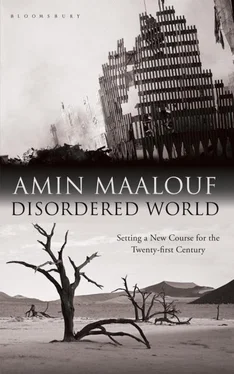What has had its day and now must end is the tribal phase of human history, the history of struggles between nations, states, ethnic and religious communities and civilisations. What we are witnessing coming to an end is the prehistory of mankind. It has been too long a prehistory, made up of all our identity-based tensions, all our blinding ethnocentricity, and a selfishness which is held to be sacred, whether based on country, community, culture, ideology or something else.
It is not my intention here to pass ethical judgement on the time-worn mechanisms of history as we know it, but to note that new realities mean we must leave them behind as soon as possible in order to embark on a completely new phase of the human adventure, a phase in which we shall not fight against the Other — the enemy nation, civilisation, religion or community — but against much more considerable, redoubtable enemies that threaten the whole of humanity.
When we set aside the debilitating habits we have acquired during our prehistory, it is abundantly clear that the only battles truly worth fighting for our species in the centuries ahead are scientific and ethical. Overcoming all illness; slowing the ageing process; making natural death retreat by several decades and perhaps one day by several centuries; freeing people from need as well as ignorance; giving them through art, knowledge and culture the inner richness which might furnish their ever-longer lives; conquering the vast universe, and all the while not damaging the ground on which we stand — those are the only conquests which should mobilise the energies of our children and theirs. I for one find those much more inspiring than any patriotic war, and as mentally stimulating as any mystical experience. It is towards such ambitions that we should now turn.
A pious wish, you may say. No, a necessity for survival and consequently the only realistic option. Having reached this advanced stage of its evolution, characterised by such a high degree of global integration, the only options for humanity are to collapse or change.
The phase of evolution I have just referred to is not an abstract concept. Never has humanity had such a need for effective solidarity and collective action to face the many dangers which assail it. They are huge dangers born of advances in science, technology and demographics, as well as the economy, and they threaten to destroy within a century everything that has been built over millennia. I am thinking of the proliferation of atomic weapons and other instruments of death. I am thinking of the exhaustion of natural resources and the return of great pandemics. Nor am I forgetting climate change, of course, which is perhaps the gravest danger humanity has had to face since the birth of the earliest civilisations.
But all these threats could also constitute an opportunity, if they allow us finally to open our eyes, to understand the scale of the challenges we have to face and the mortal risk we run if we do not change our behaviour, and do not rise — mentally and especially morally — to the level which our current stage of evolution demands.
I would be lying if I said that I have complete faith in our collective survival instinct. If such an instinct exists in individuals, it remains hypothetical for the species as a whole. At any rate, as a result of the various crises affecting us directly, it is now time to make up our minds. Either this century will be the one in which humanity goes into decline, or else it will be the century of a step change and beneficial transformation. If we needed a state of emergency to shake us up and mobilise what is best in us, we’ve got one.
I remain in a state of worried anticipation, but I also see some good reasons for hope. They are not all of the same sort and they do not all respond to the same levers, but, taken as a whole, they make it possible to imagine a different future.
The first reason for hope is that, in spite of the tensions, crises, conflicts and shocks, scientific progress continues at an increasing pace. It may seem out of place to mention among the positive signs today a tendency which has been going on for several generations. If I mention it nonetheless it is because the consistency of science may help us overcome the turbulence of this century. I shall not go so far as to say that scientific progress is the antidote to decline, but it is certainly one of its ingredients — on condition that we use it wisely, of course.
We can reasonably imagine, for example, that scientists will give us a whole range of clean technologies in the decades ahead,which will enable us to limit carbon emissions in the atmosphere so that we can escape the vicious circle of global warming. We must not imagine, however, that we can simply hand this problem over to them and continue in our current ways with a clear conscience. Our scientists probably do not have enough time to enable us to avoid the climate disturbances which could affect the planet in the first half of this century. We shall have to navigate round that difficult cape with the equipment we have on board; only afterwards will science be able to offer us long-term solutions.
My confidence in science is simultaneously limitless and cautious. To questions which are within its purview, I think it is capable in time of bringing complete answers and thereby giving us the means to realise our wildest dreams. This is simultaneously exciting and frightening, because man’s dreams contain everything, both the best and the worst, and we cannot count on science to distinguish between them. Science is morally neutral, at the service of human wisdom and human folly. In the future, just as in the past and the present, it runs the risk of being led astray, turned to the profit of tyranny, greed or archaism.
My second reason for hope is not free from worries either. I have already spoken of it: it is the fact that the most populous nations on the planet are resolutely on the way to emerging from poverty. It is possible that in the years ahead we shall witness a slowing of this process, serious disturbances and even armed conflict. Nonetheless, we now know that underdevelopment is not a given and that the eradication of centuries-old blights such as poverty, hunger, endemic diseases and illiteracy cannot be considered a naive dream. What has been shown to be possible for three or four billion people ought to be possible for six, seven or eight billion in a few decades.
From the viewpoint of human solidarity, open to the future, this clearly is a major milestone.
My third reason for hope has its source in the experience of contemporary Europe. It symbolises to me an outline of what the end of prehistory could mean in concrete terms: gradually putting behind us accumulated hatreds, territorial quarrels and ancient rivalries; allowing the sons and daughters of those who killed each other to join hands and conceive the future together; organising a shared life for six nations, then nine, twelve or fifteen, then thirty; transcending the diversity of cultures without ever seeking to eradicate them; all of this so that one day one ethical homeland will be created out of many.
Throughout history, every time someone has spoken up to say that the different nations of the planet should be reconciled, draw closer to each other, jointly manage their shared living space and think of their common future, they have been called naive for preaching utopianism. The European Union, in fact, offers us the example of a utopia in the process of being created. As such it constitutes a pioneering experiment, a plausible foretaste of what humanity, having achieved reconciliation, may be in the future and proof that the most ambitious visions are not necessarily naive.
That said, the European endeavour is not without its flaws. Everyone involved in it sometimes expresses doubts. I feel some impatience with it myself. I would like Europe to set an example of coexistence among both its founding peoples and the immigrants it has taken in. I wish it would focus much more on its cultural dimension and manage its linguistic diversity much better. I wish it would resist much more strongly the temptation to be a club of rich white Christian nations and dare to see itself as a model for the rest of humanity. And on an institutional level I would like it to dare to build a single democratic unit, the European equivalent of the United States of America, in which states are endowed with a greater cultural specificity and take pains to defend and promote them, but with federal leaders whose authority is universally recognised, elected on the same day throughout the whole continent. I am also worried about examples of timidity I see and a certain moral short-sightedness.
Читать дальше












